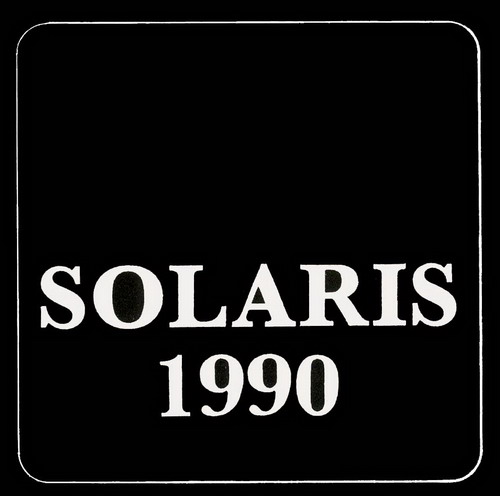
Exposé Online
What's old
Exposé print issues (1993-2011)
- 1 (October 1993)
- 2 (February 1994)
- 3 (May 1994)
- 4 (August 1994)
- 5 (October 1994)
- 6 (March 1995)
- 7 (July 1995)
- 8 (November 1995)
- 9 (March 1996)
- 10 (August 1996)
- 11 (February 1997)
- 12 (May 1997)
- 13 (October 1997)
- 14 (February 1998)
- 15 (July 1998)
- 16 (January 1999)
- 17 (April 1999)
- 18 (November 1999)
- 19 (May 2000)
- 20 (October 2000)
- 21 (March 2001)
- 22 (July 2001)
- 23 (December 2001)
- 24 (April 2002)
- 25 (September 2002)
- 26 (February 2003)
- 27 (August 2003)
- 28 (December 2003)
- 29 (April 2004)
- 30 (September 2004)
- 31 (March 2005)
- 32 (September 2005)
- 33 (May 2006)
- 34 (March 2007)
- 35 (January 2008)
- 36 (October 2008)
- 37 (July 2009)
- 38 (July 2010)
- 39 (Summer 2011)
Reviews
Solaris — 1990
(Gong HCD 37310-11, 1990/1996, CD)
Solaris — Marsbéli Krónikák (The Martian Chronicles)
(Gong HCD 17819, 1983/1995, CD)
by Mike Grimes, Published 1997-02-01


At long last, The Gong label has stepped forward and re-released Solaris' The Martian Chronicles and 1990. While both these titles have been previously available on CD, both have been out of print for quite a while, not to mention extremely difficult to find. To make these recent reissues more attractive, each CD set is augmented with not one, but two bonus tracks. Actually, the double CD reissue of 1990 contains the entire contents of the original double-LP plus the two bonus tracks. Since earlier CD versions of this album only offered three of the four sides of the LPs due to the time constraints of fitting everything on one CD, this offering has several "bonus" tracks in a way.
Solaris originally released The Martian Chronicles in 1983, and 1990 in (you guessed it) 1990. Despite its title, the latter album is primarily a compilation of four sessions recorded at different times in the 80s and packaged together. The opening notes of "The Martian Chronicles" illustrate much of what is to follow on that album — a chorus of Moog synthesizers. At times the band has three keyboardists, and all of them staunchly analog! Glides, filter sweeps, sounds ten feet thick... all the joys of analog. The music is all instrumental with a few choral-type exceptions, and the interplay between the flute, guitar, and analog synths is well orchestrated. Each instrument gets its share of the spotlight, and the music is quite diverse. Clearly, there is a strong folk influence, but there's an abundance of spacey synth sounds and rock guitar riffs to augment the ethnic aspect of their sound. The songs can go from sounding like a Brahms Hungarian Dance to the Dr. Who soundtrack to Euro-surf music before the blink of an eye. Imagine space music played in Eastern European scales by Dick Dale! Solaris doesn't play wicked-fast, complex music in complicated time signatures. Their strong point is in their arrangements and ability to create swirling instrumental textures. Their music is more fun than challenging. Like all the best albums, The Martian Chronicles comes complete with a whistle solo.
The 1990 album contains some compositions and performances on par with the tracks from The Martian Chronicles, but it's more varied in quality overall. By the mid to late 80s, Solaris acquired some digital keyboards (Rolands and E-mus it sounds like) and incorporated them into their music. This diversified the band's sound, but perhaps defocused the musical direction of the group too. For example, "Solaris 1990" is a collection of samples of several famous classical music pieces put to a disco drum machine beat. What the...? Both albums contain some great material, but The Martian Chronicles doesn't have the variance in quality that 1990 does, and is surely the "classic" album by the band. Fans of analog synths should pick up both these for the keyboard tones alone.
Filed under: Reissues, Issue 11, 1996 releases, 1990 recordings, 1995 releases, 1983 recordings
Related artist(s): Solaris
What's new
These are the most recent changes made to artists, releases, and articles.
- Review: LeoNero - Monitor
Published 2026-03-04 - Review: Sterbus - Black and Gold
Published 2026-03-03 - Release: Janel Leppin's Ensemble Volcanic Ash - Pluto in Aquarius
Updated 2026-03-02 15:06:51 - Release: Janel Leppin - Slowly Melting
Updated 2026-03-02 15:05:27 - Release: Alister Spence - Always Ever
Updated 2026-03-02 15:04:11 - Release: Let Spin - I Am Alien
Updated 2026-03-02 15:02:41 - Review: Falter Bramnk - Vinyland Odyssee
Published 2026-03-02 - Review: Exit - Dove Va la Tua Strada?
Published 2026-03-01 - Review: Steve Tibbetts - Close
Published 2026-02-28 - Release: We Stood Like Kings - Pinocchio
Updated 2026-02-27 19:24:02 - Release: Stephen Grew - Pianoply
Updated 2026-02-27 19:20:11 - Release: Thierry Zaboitzeff - Artefacts
Updated 2026-02-27 00:16:46 - Review: Kevin Kastning - Codex I & Codex II
Published 2026-02-27 - Release: Zan Zone - The Rock Is Still Rollin'
Updated 2026-02-26 23:26:09 - Release: The Leemoo Gang - A Family Business
Updated 2026-02-26 23:07:29 - Release: Ciolkowska - Bomba Nastoyashchego
Updated 2026-02-26 13:08:55 - Review: Immensity Crumb - Chamber Music for Sleeping Giants
Published 2026-02-26 - Release: The Gatekeepers - Diary of a Teenage Prophet
Updated 2026-02-25 15:55:58 - Listen and discover: Mordecai Smyth will not break your back
Published 2026-02-25
